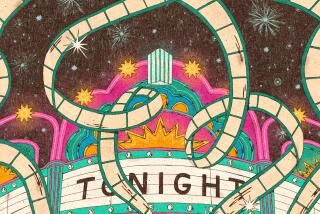MOVIE REVIEW : ‘Ben-Hur’: A Nostalgic Chariot Ride
- Share via
Today’s three-week revival of William Wyler’s “Ben-Hur” at the Cinerama Dome in a newly restored 70-millimeter, six-channel stereo print prompts the revival of that old joke: What did I think of the film? Liked Ben, hated Hur.
It’s easy to see why the movie won 11 Oscars--still the record. Released in 1959, it had all the requisite Oscar credentials of its era: a biblical theme, a mega-budget, stentorian performances, ear-splitting soundtrack. The tastefully rendered agonies of Judah Ben-Hur (Charlton Heston), prince of Judea, and his knockdown, drag-out snit with Roman tribune Messala (Stephen Boyd) are inflated to the tune of $15.9 million, a record budget for the time.
The main pleasure in revisiting this 3-hour-and-32-minute (plus intermission) behemoth is for its heavyset charms--and the nostalgia that goes with them. It’s inconceivable that a “Ben-Hur” would be made in an era when a movie like “Days of Thunder” costs $70 million to $80 million. Come to think of it, “Days of Thunder” is a modern-day “Ben-Hur,” complete with souped-up turbo-chariots and a Messalalike adversary.
I realize it’s a mark of critical distinction to downgrade blockbusters in favor of poverty-row productions, but the loss of the grand scale in modern movies isn’t all for the best. A movie like “Ben-Hur,” while almost never stirring or imaginative in the way that the true epics of Griffith or Gance or Kurosawa are, nevertheless has a basic appeal.
All those acres of red-robed centurions and Roman monoliths have an eye-popping excitement that was partially responsible for getting many of us who came of age in the ‘60s into the movie theaters. If we later came to realize that movies could be a whole lot better than “Ben-Hur,” that still doesn’t detract from the enjoyment the film still provides.
It’s true that biblical epics are, almost by definition, silly: The genre is too self-righteously stiff and moralistic, and the Monty Python boys, in “The Life of Brian,” may have killed whatever seriousness the form retained. But the climactic chariot race between Ben-Hur and Messala in “Ben-Hur” can be enjoyed without apology; it’s still the best of its kind.
And the scenes in the galley, with Ben-Hur and his scowling cohorts rowing for their lives, needs no apology, either. Heston strikes a heroic figure and Boyd looks like he is prepping to play Iago in a road-show “Othello.” (Gore Vidal, along with Maxwell Anderson, S.N. Behrman and Christopher Fry one of the film’s several uncredited script doctors, claimed he smuggled a homoerotic subtext into the Ben-Hur/Messala squabble.)
There’s another reason to bemoan the loss of the biblical epic. The genre invariably supplied the occasion for a review in Esquire by the late Dwight MacDonald, and no critic has ever been funnier in print than MacDonald was on biblical films. He felt the only excuse for their existence was the Roman orgy scenes.
MacDonald lamented that “watching ‘Ben-Hur’ was like waiting at a railroad crossing while an interminable freight train lumbers past, often stopping completely for a while.”
MacDonald is right but he is also wrong. That freight train hauls a few goodies.
More to Read
Only good movies
Get the Indie Focus newsletter, Mark Olsen's weekly guide to the world of cinema.
You may occasionally receive promotional content from the Los Angeles Times.









